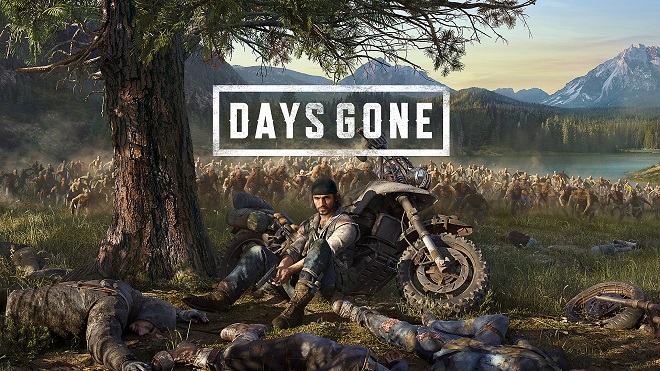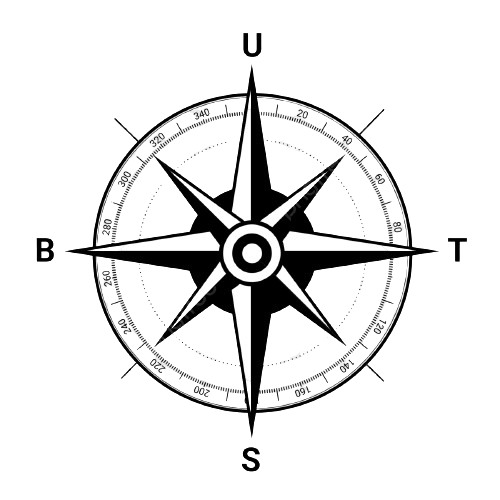
Days Gone’s loading icon is an in-game model of a ring. He appears whenever the game’s surprisingly frequent loading screens appear, spinning in the bottom-right corner, glowing silver. It’s a symbol the game treats with great reverence; it was a gift from the biker protagonist’s (apparently) deceased wife before she died, and it’s a kind of leitmotif, always there and then, quickly out of memory. But it’s also a noisy one, a self-consciously angular piece of jewelry shaped like the skull of a dead animal. Days Gone is sincerely respectful of this object and the relationships it symbolizes, but it’s also a little insensitive; it’s so wrapped up in its own world that it doesn’t realize how silly it seems.
This feeling permeates developer Bend Studio’s new game, Days Gone. It’s a PlayStation 4 exclusive, and it’s set in a huge open world filled with a variety of enemy forces, including hordes of seemingly endless zombies (called “freakers,” that’s obvious). It’s more interesting than it first seems, but it’s also a little too much. This is a game that fully respects the world it creates, without knowing that that world is much more absurd than the game leads you to believe.
Days Gone tells the story of Deacon St. John, a biker who used to belong to a fictional gang called the Mongrels. After the zombie apocalypse ravages his world, he lives in Oregon with his best biker buddy Boozer. The two survive as nomadic assassins, doing odd jobs, taking on bounties, and traveling between various fenced-off survival camps. There’s nothing here that video game and Sons of Anarchy fans haven’t seen before, and it plays out just as you’d expect to play a game in this setting. There’s a lot of driving, searching for supplies, and regular sneaking and combat in between. There are enemy raider outposts to conquer, Walking Dead nests to wipe out, cargo to heal, and friendly factions to ingratiate yourself with. There’s an upgrade tree; there’s another power-up system to improve Deacon’s health, stamina (which determines how far he can run), and focus, and he can slow down time, the biker’s famous superpower. If you’ve played an open-world game developed in the shadows of Far Cry 3, everything here will feel incredibly familiar.
The main difference between Days Gone and many of the games that imitate it is your tools. Throughout the game, your main companion is a motorcycle, which can be upgraded and becomes increasingly stylish and useful as the game progresses. Similar to Mad Max and his car, there is a symbiotic relationship between Deacon and his motorcycle, which is a necessary vehicle for Deacon’s survival and gives him power and identity. Without the motorcycle he is useless, and without it he is just a decaying piece of machinery in a world where such things are of little use. Upgrading the motorcycle is simple yet satisfying, and you quickly become used to it as the game progresses.

Another very successful aspect of the game is the setting. Oregon is a fascinating and unusual place for an open world, full of fog, rain, and tree-lined hills. The game tries to capture the natural wonders of the Pacific Northwest in a way that evokes emotion even in a dingy, post-apocalyptic setting. The quiet moments are enjoyable as you drive through some of the most beautiful landscapes in North America and simply appreciate the world that Bend Studios (which is supposedly based in Oregon itself) has crafted.
But a game like this can’t be sustained by beauty alone, and there are too many elements to take it seriously even at a distance. Days Gone is desperate to impress you with its massive, beautiful zombie hordes. Hundreds of them, all running around in a fluid mass, like Sentinels in the Matrix sequels. And while they’re certainly technical achievements, they’re not particularly interesting conceptually or mechanically, and ultimately only serve to reinforce how generic Days Gone’s enemies really are. This is a zombie apocalypse we’ve seen dozens of times before. There are shady government organizations, robbers who have abandoned humanity, and the zombies themselves. If your zombie fiction doesn’t go beyond the latest season of The Walking Dead, that’s a problem. The world of Days Gone would be much more interesting without any antagonists.
But the absurdity on which the game is based becomes even more pronounced when you try to delve into politics. To Bend Studio’s credit, they really put a lot of thought into the idea of what Oregon’s political views would be in a world where a zombie apocalypse has occurred. The various factions represent a range of political viewpoints ripped from the headlines, one of the most prominent being apocalyptic-style reactionary libertarianism, represented by the faction’s leader, Copeland. Copeland broadcasts an Alex Jones-esque radio show to the post-apocalyptic frontier, blaming the government and foreign products, much like the kind of person who would blame George Soros for the existence of zombies. There’s a clear satirical streak in this presentation, but that doesn’t change the fact that the basic premise of Days Gone leans towards this kind of ideology. This is a game about sneaking into prepper bunkers to get supplies (Far Cry 5 has that too, but it’s one of the most disgusting trends in modern open-world experiences). Its vision of a society turning into a warlike feudalism under pressure from outside powers, rewarding only those dedicated to survival and the power to become armed and dangerous, is a reactionary libertarian power fantasy at a fundamental level. It posits the post-apocalyptic world as a reward for the strong, a return to nature, and how much Days Gone relies on this premise makes its supposed political neutrality seem absurd.

And Days Gone relies entirely on absurd ideas that are as loud as Deacon’s ringtone. From the reactionary fantasy at its core to the reverence shown in its noble biker protagonist (not to mention the sheer silliness of imagining vanilla zombies as a threat in 2019), everything feels absurd. Days Gone isn’t necessarily a bad game; the gameplay ranges from generic to addictive, and the story of a man and his bike has a unique charm. But it’s also a game that wants to be taken seriously, but also never takes itself seriously.

Leave a Reply